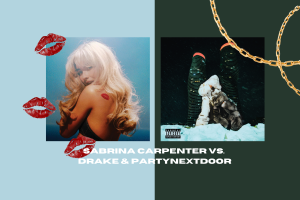Don’t Worry Darling: A Spoiler Free Review
A silhouette of Harry Styles, playing Jack Chambers, and Florence Pugh as his wife Alice is pictured. Yasmin Garada reviews “Don’t Worry Darling”,
November 15, 2022
A clink of a martini glass, the retro-chic convertibles, and uniform cocktail dresses, Olivia Wilde’s psychological thriller “Don’t Worry Darling” made its debut in theaters on Sept. 23, and built quick tension between viewers with a Rotten Tomato rating of only 38%.
Taking place in a desert town known as Victory, a utopia through and through, decorated with midcentury homes at the end of a cul-de-sac, young families find themselves fulfilled by their homogeneous schedule under the idyllic shimmer of the Southern California sun.
Given that the film is set in the 1950s, the citizens and cast are more racially diverse than expected, yet their actions follow an eerily standard pattern through the routine they follow.
Tidy uniforms, taking off to work at the same time, the wives kissing their husbands goodbye, and the unwavering smiles of women- Wilde paints a seemingly perfect scene, but cracks become increasingly obvious.
Domestic bliss is soon interrupted by unexplained visions of a plane crash, Busby Berkeley-style dancing girls, and flashes of our protagonist, Alice Chambers, in what she believes to be another life. After being gaslit and convinced she’s just stressed, she’s driven onto the brink of insanity and an overwhelming need to find the source of her pain.
Through its erratic pacing and sudden epiphanies, what was originally a romance drama period piece leaves us with a dizzying and tension-filled plot to uncover the destructive secrets behind such a flawless world.
Though the movie itself had gleaming cinematography, the media coverage over uncovered drama between the director and cast members took over any focus on the actual movie. Harry Styles’ casting as Jack Chambers fits the premise of the movie, yet Wilde found herself in an interview with Variety accused of having fired Shia LaBeouf, the original cast for Jack. LaBeouf later refuted her statement, saying he left the film on his own accord and provided a long list of receipts to back his story.
With cast breakups, feuds, and text leaks, the movie garnered much attention for the wrong reasons. Despite all this, it’s hard to dispute that Florence Pugh’s emotional excellence within the role of Alice was unmatched. With her screen time being the longest, her scenes gained a major advantage for the movie as a whole.
“Don’t Worry Darling” leads up to an ending that will leave you with more questions than you started with. It’s safe to say that the post-movie conversations and theories will be more stimulating than the movie itself.








